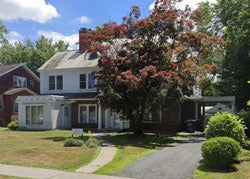
It was my life-long love of aquatic ecosystems that led me to pursue PhD work at RPI. During my time at RPI I studied how ongoing large-scale changes (chiefly warming of lakes) are affecting the physical and chemical environment of lake ecosystems. After receiving my PhD in December of 2020, I continued briefly in the lab of my advisor Dr. Kevin Rose before moving on to Cornell as an Atkinson Postdoctoral Fellow. During the academic year of 2019-2020, I was greatly blessed to be able to do my research at Uppsala University in Sweden after receiving a Fulbright grant. The opportunity to live in such a beautiful country and get some immersion in the culture was one of the highlights of my life.
Where did you do your Fulbright program and what was the purpose of the study grant?
My grant funded a year of research in the lab of Dr. Gesa Weyhenmeyer at Uppsala University in Uppsala, Sweden. The purpose was to conduct PhD level research in ecology, specifically, how certain types of chemical changes impact the biotic communities of lake ecosystems.
How did you engage with the local people?
In Sweden, time in nature is highly valued and outdoor activities such as skiing, hiking, etc. are very popular. There is an organization devoted to such activities called Friluftsfrämjandet that I got involved with. I joined Friluftsfrämjandet Uppsala Alpint, which is the local Uppsala alpine skiing chapter of the organization. The intent was to teach skiing to young children. Unfortunately, it was a very poor winter in terms of snow and the local ski area was never able to open. Nevertheless, it was a great opportunity to interact with local Swedish ski instructors, even taking a couple group trips north for weekend ski clinics. I also got involved with several local groups that did day hikes in the surrounding countryside.
What was the most rewarding aspect of your Fulbright experience?
The many really wonderful people that I met and lasting relationships that I established. I really enjoyed working with my Fulbright sponsor at Uppsala University and the people in the limnology group. In addition, I met so many people through hikes, skiing, and at the local church. I think I will have a warm place in my heart for Sweden for the rest of my life because the people were so kind and welcoming, and because they have really amazing coffee and pastries!
What surprised you the most?
Though I have traveled to many countries in the past, it is a completely different experience to live in a foreign country. What really surprised me was the amount of adjustment required to acclimate to cultural and other differences, such as weather and the light environment of a northern country like Sweden.
Did Covid-19 affect your experience, and if so, how?
Yes, it did. I was scheduled to stay through June of 2020. Covid really began impacting Sweden in March and by mid-March, we were informed that the State Department recommended our early return to the US. Many European countries began closing their borders and I made the decision to return. Not long afterwards, the Fulbright program was officially ended for the 2019-2020 year. I was able to complete my work remotely. Still, I was disappointed not to experience Sweden in the warmer months, although I recognize this was beyond anybody’s control.
How did you prepare in the year/months prior to departure?
Though I was not a Swedish speaker and Swedish Fulbrighters are not required to know the language, I did actually spend time trying to learn as much of the language as I could. I never reached any level of fluency, but I believe there were many in Sweden who really appreciated that I at least made some effort to learn the language. I also put my name on a waiting list for housing in Uppsala before I even knew whether or not I would be going. I had heard that housing in Sweden could be difficult to find, and this ensured that I was able to find a good option. Similarly, I had to make arrangements for what to do with all of my things while I was gone for a year, including a car and a good amount of furniture. There was also paperwork associated with the move, including medical forms, insurance related documents, a Swedish residency permit, and other things. All of this had to be taken care of prior to leaving for Sweden.
How were you received as an American?
People were very welcoming. I think many were interested in getting to know me merely due to the fact that I was from the US and so was a bit out of the norm. Also, many Swedes are exceptional English speakers and I think there were instances where people were excited about the prospect of having a native English speaker to practice with.
What advice do you have for students considering applying?
First and foremost, if you think you might be at all interested, by all means apply. It does require a significant amount of effort, but the rewards are well worth it. Perhaps also be persistent. I actually applied twice and it was in the second year that I applied that I received the award. Some additional advice should you end up getting a Fulbright is to prepare for some acclimation to your host country. It seems like no matter how much you try to learn in advance in order to mentally prepare for things, something is likely to surprise you about life in your host country. Just consider it part of the experience!
The Fulbright U.S. Student Program provides year-long awards for research, study, or English Teaching Assistant positions abroad.
